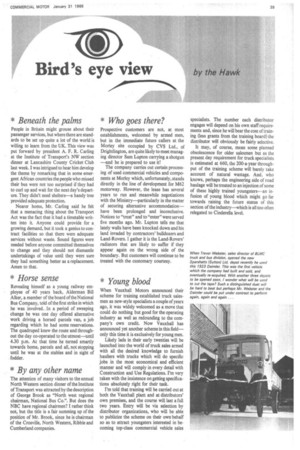Bird's eye view
Page 41

If you've noticed an error in this article please click here to report it so we can fix it.
* Beneath the palms
People in Britain might grouse about their passenger services, but where there are standards to be set up quite a lot of the world is willing to learn from the UK. This view was put forward by president A. F. R. Carling at the Institute of Transport's NW section dinner at Lancashire County Cricket Club last week. I was intrigued to hear him develop the theme by remarking that in some emergent African countries the people who missed their bus were not too surprised if they had to curl up and wait for the next day's departure. They didn't need shelters—a handy tree provided adequate protection.
Nearer home, Mr. Carling said he felt that a menacing thing about the Transport Act was the fact that it had a timetable written into it. Anyone could provide for a . growing demand, but it took a genius to contract facilities so that there were adequate services without waste. Sound figures were needed before anyone committed themselves to change and they should not dismantle undertakings of value until they were sure they had something better as a replacement. Amen to that.
* Horse sense
Revealing himself as a young railway employee of 40 years back, Alderman Bill Alker, a member of the board of the National Bus Company, told of the first strike in which he was involved..In a period of sweeping change he was one day offered alternative work driving a horsed parcels van, a job regarding which he had some reservations. The quadruped knew the route and throughout the day co-operated to the utmost—until 4.30 p.m. At that time he turned smartly towards home, parcels and all, not stopping until he was at the stables and in sight of fodder.
* By any other name
The attention of many visitors to the annual North Western section dinner of the Institute of Transport was attracted by the description of George Brook as "North west regional chairman, National Bus Co.". But does the NBC have regional chairmen? I rather think not, but the title is a fair summing up of the position of Mr. Brook, since he is chairman of the Crosville, North Western, Ribble and Cumberland companies.
* Who goes there?
Prospective customers are not, at most establishments, welcomed by armed men, but in the immediate future callers at the Morley site occupied by CVS Ltd., of Drightlington, are quite likely to meet managing director Sam Lupton carrying a shotgun —and he is prepared to use itl The company carries out certain processing of used commercial vehicles and components at Morley which, unfortunately, stands directly in the line of development for M62 motorway. However, the lease has several years to run and meanwhile negotiations with the Ministry—particularly in the matter of securing alternative accommodation— have been prolonged and inconclusive. Notices to "treat" and to "enter" were served five months ago. Mr. Lupton tells me that lately walls have been knocked down and his land invaded by contractors' bulldozers and Land-Rovers. I gather it is the Land-Rovers' radiators that are likely to suffer if they appear again on the wrong side of the boundary. But customers will continue to be treated with the customary courtesy.
* Young blood
When Vauxhall Motors announced their scheme for training established truck salesmen as new-style specialists a couple of years ago, it was widely welcomed as a move that could do nothing but good for the operating industry as well as redounding to the company's own credit. Now Vauxhall has announced yet another scheme in this field— only this time it is exclusively for young men.
Likely lads in their early twenties will be launched into the world of truck sales armed with all the desired knowledge to furnish hauliers with trucks which will do specific jobs in the most economical and efficient manner and will comply in every detail with Construction and Use Regulations. I'm very taken with the insistence on getting specifications absolutely right for their task.
I'm told that training will be carried out at both the Vauxhall plant and at distributors' own premises, and the course will last a full two years. Entry will be via selection by distributor organizations, who will be able to publicize the scheme on their own behalf so as to attract youngsters interested in becoming top-class commercial vehicle sales
specialists. The number each distributor engages will depend on his own staff requirements and, since he will bear the cost of training (less grants from the training board) the distributor will obviously be fairly selective.
It may, of course, mean some planned obsolescence for older salesmen but as the present day requirement for truck specialists is estimated at 660, the 200-a-year throughput of the training scheme will barely take account of natural wastage. And, who knows, perhaps the engineering side of road haulage will be treated to an injection of some of these highly trained youngsters—an infusion of young blood which might go far towards raising the future status of this section of the industry—which is all too often relegated to Cinderella level.




































































































